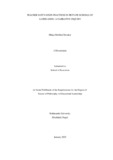
Please use this identifier to cite or link to this item:
https://hdl.handle.net/20.500.14301/540| Title: | Teacher Motivation Practices in Private Schools of Kathmandu: A Narrative Inquiry.[Unpublished Mphil Disertation] |
| Authors: | Chitrakar, Minju Shobha |
| Citation: | Chitrakar, M.J. (2025).Teacher motivation practices in private schools of Kathmandu: A narrative inquiry. |
| Issue Date: | Jan-2025 |
| Publisher: | Kathmandu University School of Education |
| School: | SOED |
| Department: | DOEL |
| Level: | M.Phil. |
| Program: | MPhil in Educational Leadership |
| Abstract: | This study explores the motivational practices exercised by private schools for teachers and focuses on identifying effective strategies as well as gaps for improvement. This study theorizes motivational bases, such as Maslow's Hierarchy of Need Theory and Transformational leadership theory to substantiate the complementary effect of intrinsic and extrinsic motivators in making teachers satisfied and engaged. It particularly explored how teachers perceive the term motivation and what the practices are. Using narrative inquiry in qualitative research explores motivational aspects like financial and job security, leadership style, workload, peer relationships, infrastructure, recognition, and equal treatment. The findings of the study reveal that, where both intrinsic and extrinsic motivators have a vital role to play, financial stability makes its position at the top. No matter what the cause or consequences, if the teachers are provided with enough financial benefits, all other motivators activate themselves. It also reveals that the priority or the meaning of motivation changes with the age of teachers. The study's implications are regarded as significant for teachers, school leaders, and policymakers. For the teachers, this research encourages them to update themselves with the demands of time; for leaders, this research emphasizes balancing extrinsic and intrinsic motivation so as to adopt a holistic approach to motivation. For policymakers, it highlights developing standardized guidelines aligned with educational policy and the Labor Act so as to ensure sustainable motivation practices for teachers in private schools. Further research suggests adopting mixed or quantitative data analysis techniques to view the wider perspective of teacher motivation in private schools in Kathmandu. Eventually, this study contributes to adopting ways to keep teachers motivated so as to ensure their satisfaction and retention, which ultimately impacts the sustainability of private schools in Kathmandu. |
| URI: | https://hdl.handle.net/20.500.14301/540 |
| Appears in Collections: | Dissertation |
Files in This Item:
| File | Description | Size | Format | |
|---|---|---|---|---|
| Minju Shobha Chitrakar, Final Dissertation.pdf | 1.57 MB | Adobe PDF |  View/Open |
Items in DSpace are protected by copyright, with all rights reserved, unless otherwise indicated.